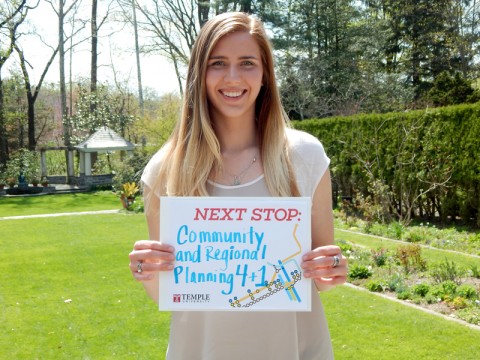
Ashley Nuckles (BS CDEV'15)
Ashley Nuckles took the scenic route to community development as a career.
“In my freshman year of college, I went into pre-dentistry, then biology. Then I went to Bucks County Community College and got my associate’s degree in Business Administration,” said Nuckles, who will be among the first students to graduate from Temple’s undergraduate Community Development program. “After that, I was going to continue in business, but I had a real ‘summer of transition’ where I realized that wasn’t the right fit for me. I started doing some research and discovered planning and landscape architecture as potential careers — it opened my eyes to so many new possibilities.”
When May 2016 rolls around, it might feel like déjà vu for Nuckles. As part of the Community Development “4+1” program, she has been taking master’s level courses while completing her undergraduate degree. In just one year, she will also finish up her master’s in Community and Regional Planning.
“Being able to complete both degrees in just five years, it’s exciting and such an advantage to me as a planner. In community development, I have the benefit of learning about localized community engagement while the planning program has a more regional perspective,” she said. “It is such a huge field and I like every aspect of it — the program has allowed me to develop my own skill set and become a more well-rounded professional. I could transition easily from the public or the private sector.”
While completing her degrees, Nuckles has been putting her community development and planning skills to good use, interning with the Greater Valley Forge Transportation Management Association’s (GVFTMA), non-profit program Communities in Motion and supporting research in Temple’s Center for Sustainable Communities.
“I’ve had the opportunity to work on energy efficiency projects covering all of the Delaware Valley Regional — 353 municipalities. I’ve worked on Traffic Demand Management studies along the Route 422 corridor; that’s just two of the many opportunities I’ve had as a student to use what I’ve learned practically in a real-world setting for actual clients and organizations,” said Nuckles, who was the recent recipient of the Community and Regional Planning Award for Academic Excellence and the School of Environmental Design Alumni Association Award. “I think one of the advantages of Temple’s program is that the classes are typically small in size and the professors are both educators and practitioners; that makes all the difference. The program is very much focused on practice — you get an excellent sense of what’s out there and what you will be doing in the profession.”
At home, Nuckles is applying her skills as well, volunteering at the local non-profit Langhorne Open Space, where, in addition to being a member of the community garden, she was asked to present a strategic plan — a five year vision for the group — to the organization’s board.
In Lower Southampton, the municipality is working to develop a walkable town center, a daunting task in an area where the township meets Bensalem and a SEPTA regional rail line, she said.
“With this many stakeholders involved, it becomes a complex challenge to get everyone to work together toward a common goal that will benefit the community. The township is putting together an advisory committee and I’d like to be part of it,” said Nuckles. “I think often times people forget that they create the environment around them — they have a say in how it is shaped and, hopefully, improved. From my standpoint, I have this background in community development and planning combined with a strong sense of community. It only makes sense to use those skills for the betterment of the community I live in.”
During her time at Temple, Nuckles said, she has had the opportunity to take classes at the Ambler, Main and Center City campuses, “all very different environments that emphasized different approaches to planning.”
“I can take the skills I’ve learned and apply them to multiple different regions and multiple different types of planning,” she said. “My Temple experience has combined small university teaching and classroom size with the environment of a large research university — I’ve had the opportunity to experience all that Temple has to offer. I’ve been able to converse with my teachers and personally relate to the faculty and my department chair. Accessibility, I think that’s a very special part of Temple.”
Photo and story credits: JDuffy